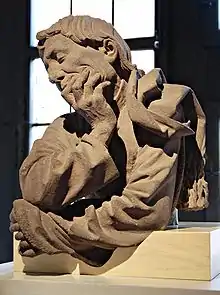
Nikolaus Gerhaert (c.1420 – 28 June 1473), also known as Nikolaus Gerhaert van Leyden, was a Dutch sculptor, although aside from his sculptures, few details are known of his life. He worked in both stone and wood.
Biography
Gerhaert is considered to be the most influential northern European sculptor of the 15th century. He was born in Leiden, Holland (present day Netherlands) sometime around 1420. Based on the location of his work, he spent most his working life in the Germanic areas of Trier, Straßburg, Baden, Konstanz, and Vienna. Much of his documented work is lost to history, but what has survived is characterized by elaborate drapery and extreme physical realism, both extraordinarily vivid and unconventional. His specialties were tombs, altarpieces and other religious pieces. Sandstone and limestone are among his most frequent mediums.
One of his most well known works currently resides in the Musée de l’Œuvre Notre-Dame in Strasbourg (Alsace, present day France). Called the Buste d'homme accoudé (circa 1465), it is an undisputed masterpiece, and is believed to be a self-portrait. Gerhaert died on 28 June 1473[1] in Wiener Neustadt (present day Austria) while working on the tomb of emperor Frederick III. Nicolaus Gerhaert was summoned to the imperial court to create this tomb after the death of his wife empress Eleanor of Portugal. The tomb was completed in 1513.
Works
Public works attributed to Nicolaus Gerhaert are the following:
- In Germany
- Baden-Baden, parish church: Crucifix of Baden-Baden, 1467[2]
- Berlin, Bode museum: Madonna with child, circa 1460/1470
- Frankfurt, Liebieghaus: Two heads, a prophet and a sibylle, fragments from the portal of the Strasbourg chancellery
- Trier, Museum am Dom Trier: Tomb of archbishop Jakob von Sierck, 1462
- In Austria
- Vienna, Stephansdom: Tomb of emperor Frederick III
- In France
- Strasbourg, Cathedral of Strasbourg, chapel on the left side of the choir: Epitaph of canon Conrad de Bussnang, 1464[3]
- Strasbourg, Musée de l'Œuvre Notre-Dame:
- Head of an ottoman in turban, circa 1464
- Meditating man, before 1467
- Head of a man with lopsided face, red sandstone
- In the United States
- New York, Metropolitan Museum of Art: Standing virgin with child, circa 1470[4]
- Chicago, Art Institute of Chicago: Saint Margaret of Antioch (attributed), walnut with traces of polychromy, circa 1465
Gallery
 Dangolsheimer Muttergottes (attributed), Strasbourg circa 1460/63 (Bode-Museum, Berlin)
Dangolsheimer Muttergottes (attributed), Strasbourg circa 1460/63 (Bode-Museum, Berlin) Man meditating (possibly self-portrait), circa 1465 (Musée de l’Œuvre Notre-Dame, Strasbourg)
Man meditating (possibly self-portrait), circa 1465 (Musée de l’Œuvre Notre-Dame, Strasbourg)_Liebieghaus.jpg.webp) Sibylle, also referred to as Barbara von Ottenheim, Strasbourg circa 1460/63 (Liebieghaus, Frankfurt)
Sibylle, also referred to as Barbara von Ottenheim, Strasbourg circa 1460/63 (Liebieghaus, Frankfurt) Sibylle, also referred to as Barbara von Ottenheim, plaster
Sibylle, also referred to as Barbara von Ottenheim, plaster.jpg.webp) Prophet with turban, possibly James von Lichtenberg (Musée de l’Œuvre Notre-Dame, Strasbourg)
Prophet with turban, possibly James von Lichtenberg (Musée de l’Œuvre Notre-Dame, Strasbourg)_Liebieghaus.jpg.webp) Prophet with turban, plaster
Prophet with turban, plaster Buste of man with lopsided face, from his workshop (Musée de l’Œuvre Notre-Dame, Strasbourg)
Buste of man with lopsided face, from his workshop (Musée de l’Œuvre Notre-Dame, Strasbourg).jpg.webp) Head of man (attributed) (Musée de l’Œuvre Notre-Dame, Strasbourg)
Head of man (attributed) (Musée de l’Œuvre Notre-Dame, Strasbourg) Fragment of tomb of Konrad von Bussnang
Fragment of tomb of Konrad von Bussnang Standing Virgin and Child[5]
Standing Virgin and Child[5] Saint Margaret of Antioch (attributed) (Art Institute of Chicago)
Saint Margaret of Antioch (attributed) (Art Institute of Chicago) Tomb of emperor Frederick III in St. Stephen's Cathedral in Vienna
Tomb of emperor Frederick III in St. Stephen's Cathedral in Vienna
See also
References
- ↑ Renate Kohn, 'Eine bisher unbekannte Grabinschrift des Niclas Gerhaert von Leyden', Wiener Geschichtsblätter 48 (Vienna 1993), pp. 164–70.
- ↑ (in German) Mechtild Ohnmacht, Das Kruzifix des Niclaus Gerhaert von Leyden in Baden-Baden von 1467 : Typus, Stil, Herkunft, Nachfolge, P. Lang, Francfort, Berlin, Berne, 1973, 157 p. ISBN 3-261-00868-7 (texte remanié d'une thèse, Munich, 1971).
- ↑ (in French) Philippe Lorentz, « Nicolas Gerhaert de Leyde et le chanoine Conrad de Bussnang : au cœur d'un réseau de commanditaires », in Fabienne Joubert (dir.), L'artiste et le clerc : commandes artistiques des grands ecclésiastiques à la fin du Moyen Âge (XIVe-XVIe siècles), Presses Paris Sorbonne, 2006, p. 305-328, ISBN 9782840504382
- ↑ "Attributed to Niclaus Gerhaert von Leyden | Standing Virgin and Child | Austrian". The Metropolitan Museum of Art. Retrieved 2 December 2023.
- ↑ Standing Virgin and Child, picture and commentary from the Metropolitan Museum of Art. It is one of only eight works in wood attributed to Nikolaus.
- "Nikolaus Gerhaert von Leyden". In Encyclopædia Britannica Online.
- Buste d'homme accoudé at the Musée de l'Oeuvre de Notre Dame in Strasbourg, picture and commentary from the Web Gallery of Art
External links
![]() Media related to Nicolaus Gerhaert van Leyden at Wikimedia Commons
Media related to Nicolaus Gerhaert van Leyden at Wikimedia Commons